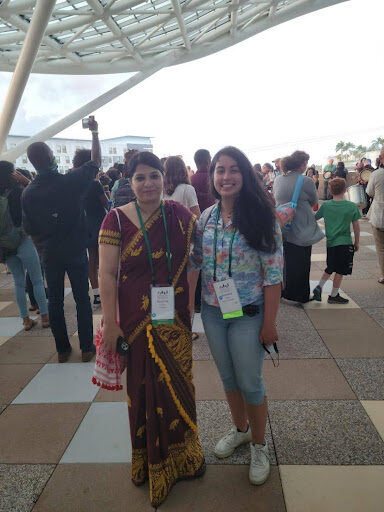By Vanessa Poirier, PhD Student at Université du Québec à Montréal
I walked into the 9am plenary talk at the American Ornithological Society conference with the expectation of learning something interesting about birds, that was hopefully easy enough to digest before my coffee. The hour that followed surpassed every expectation. I listened to a story of hope, innovation, perseverance, and strength. It was a story of building a community that would share knowledge, inspire action, and empower women; a truly amazing tale about bridging the sometimes seemingly insurmountable gap between problem and solution.
Named the “Stork Sister” by her community, a title now recognized world-wide, Dr. Purnima Devi Barman is truly a loving sibling to the Greater Adjutant Stork (Leptoptilos dubius). A bird facing extinction in the early 2000s is now thriving with the help of the Hargila army. The Hargila army is an all-women conservation group founded in the Indian state of Assam that intertwines culture and science communication.
I was particularly inspired by the moment which marked Dr. Barman’s path: a man cutting down a tree causing a stork’s nest to fall in its wake. She asked the man why he would do such a thing and he laughed. In other words, she was a ‘tree-hugger’; a term meant to inspire shame. In truth, she was the honorable defender of these mistreated creatures. These tall birds with vulture-like bald heads and long-hanging throat pouches were interpreted as ugly. In fact, the storks were regarded as bad omens and carriers of disease and thus generally detested by the community. Dr. Barman, however, saw their importance to the native ecosystem and wondered how to get everyone else to see their beauty.
Dr. Barman found that the key was community values. A great example of this being the Hargila Army’s stork baby showers: a traditional celebration of song and prayer usually reserved for fellow humans but offered to the storks instead. We have all heard the stories of storks ushering in a new baby, but never of humans returning the favor. It was a true symbol of unity with nature. Once you have blessed a baby stork, you surely cannot turn around and cut down its home. The relationship between human and stork did not stop there; the Hargila Army gathered for ceremonies, cooking and biodiversity classes. Word spread of the storks and so grew their reputation as sacred birds.
Not only this, but the Hargila Army is an empowering movement for women. The conservation group generates income by selling traditional clothes with Hargila motifs on them, allowing the women involved to become more economically independent. This, in turn, is another example of blending culture and conservation.
As I left the auditorium, the story of the Hargila Army stuck with me. The idea of transforming a whole community’s way of thinking seemed nearly impossible only an hour prior. Our modern problems seem to stem from the values ingrained in our culture and so a proper solution should equally come from a change in societal ideals. This is an idea that I will take with me in my future endeavors as a science communicator. I hope this story has inspired you as much as it has me.

About the author: Vanessa Poirier is a PhD student at the Université du Québec à Montréal studying urban ecology and ornithology.
Resources:
Ogden, Lesley Evans. “How Baby Showers Are Helping to Restore an Endangered Stork’s Sullied Reputation.” Audubon, 1 Feb. 2023, www.audubon.org/magazine/spring-2020/how-baby-showers-are-helping-restore-endangered.
Pinto-Rodrigues, Anne. “Mobilising Assam’s ‘Hargila Army’: How 10,000 Women Saved India’s Rarest Stork.” The Guardian, 9 Feb. 2023, www.theguardian.com/global-development/2023/feb/09/assam-hargila-army-women-saved-india-rarest-stork-greater-adjutant.

0 Comments